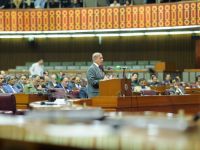Syria's ban on Lebanese Druze leader Walid Jumblatt and his allies is aimed at nipping in the bud the growing questioning in Beirut of its domination of Lebanon, diplomats and press commentators said Wednesday.
The Arabic-language service of Radio Monte Carlo first reported Tuesday that Jumblatt had been declared persona non grata in Syria, following his call last week for a reduction of the Syrian troop presence in Lebanon.
The Druze leader has not so far reacted to the Syrian move, which Lebanese sources said also applied to 16 other deputies in Jumblatt's parliamentary group, including three ministers in the new government of Rafiq Hariri.
"Damascus is annoyed at a one-time ally who has joined the camp of the anti-Syrian Christians," a western diplomat commented.
"Its message is that there are limits which cannot be crossed by those who are not traditional opponents like the Christians, who are kept in isolation."
The daily As-Safir, which is considered pro-Syrian, said Damascus had taken disciplinary measures against Jumblatt for what it considered a provocation on his part.
Jumblatt, formerly considered pro-Syrian, joined mostly-Christian MPs in asking in parliament last week for the redeployment of Syrian troops who have been in Lebanon since 1976, a year after the outbreak of Lebanon's 1975-1990 civil war.
The issue dominated five days of parliamentary debates before Monday's vote of confidence for Hariri's government.
Syria has not officially confirmed the bar, and has played down the importance of the statements calling on it to quit Lebanon.
Syrian officials say they only deal with the Lebanese government, which it has traditionally dominated and which has said the Syrian troop presence is legal and necessary.
Damascus says Lebanon and Syria should stick together as long as there is no peace treaty with Israel, whose forces ended a 22-year occupation of southern Lebanon in May.
Pro-Damascus politicians meanwhile have accused Jumblatt in the strongest of terms of "collaborating" with Israel.
The Christian parties which lost the civil war have welcomed Jumblatt's stance, and bishops of the Maronite church Wednesday slammed the "threats" being made against him.
But Lebanese newspapers expressed concern that Syria's move could seriously weaken the Hariri government only days after it was approved by parliament.
"Damascus is probably not against reducing its military presence in Lebanon, but considers the time is not ripe in the current Middle East situation," the western diplomat commented.
Another added: "Syria will always refuse to act under pressure, and this is what President Bashar al-Assad told Jumblatt in Damascus in the summer," after the Druze leader made his first criticism of Lebanon's powerful neighbor.
"Syria does not want to lose the Lebanese card in its confrontation with Israel" over the occupied Golan Heights, following the breakdown in their talks last January, the diplomat said.
"It may also be a veiled warning to Hariri, who had already lost his job as prime minister in 1998 because Damascus suspected him of mulling a separate peace with Israel" -- BEIRUT (AFP)
© 2000 Al Bawaba (www.albawaba.com)







